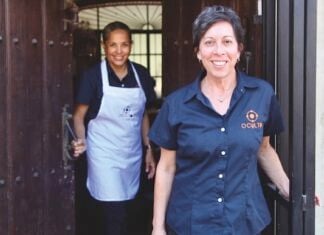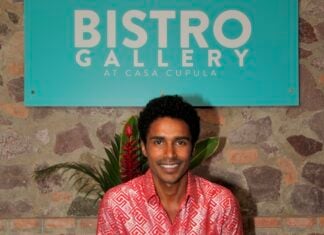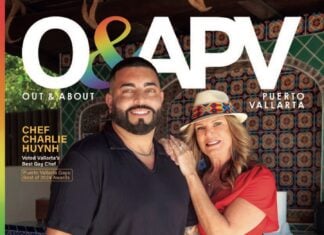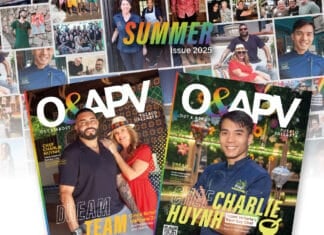Esta publicación también está disponible en: English Español
STILL FUNNY, STILL FRESH: JOSEPH FENITY CATCHES UP WITH THE DRAG ICON
So just how long does a head of lettuce stay fresh? A quick internet search suggests a couple of weeks, if you’re lucky. For Hedda Lettuce, it’s been a lucky last three decades. In an era overpopulated with drag queens, Steve Polito refuses to wilt away. O&A’s Joseph Fenity recently caught up with the world’s most famous green haired drag queen to chat about her latest show and her love affair with Puerto Vallarta.
This interview has been lightly edited for clarity and length.
JOSEPH FENITY: You’re celebrating a decade of performing in Puerto Vallarta. What brought you here and why PV?
HEDDA LETTUCE: About 10 years ago I was working on an Atlantis cruise ship and we had an overnight stay in Puerto Vallarta. Since we had a full night, they stuck us all in little minivans—all the queers squeezed in these little vans—and they drove us to the Romantic Zone. That’s when I went to Paco’s Ranch and saw this beautiful boy—and he saw me. My friend said, “Don’t go home with anybody, especially in a foreign country.” But gay people don’t listen. We make up our own rules. So, I gladly left with him. Now he didn’t speak English and I didn’t speak any Spanish. We walked to his neighborhood in Emiliano Zapata and I saw these chickens and roosters and I’m like, “Where are we? What is going on? Is this finally it for me?” So, we get to his building and we walk up one flight of stairs and then another flight and another. Finally, we get to the roof and now I’m really thinking, “Oh my God, this is it—this is the end.” But up on the roof was a cabana and we made love for two hours on that rooftop. Then there was a full moon afterwards. We walked down those seven flights of stairs and went to a nearby taco stand. I ate a taco and somehow I didn’t get sick. Then on my walk back through town, I see posters and banners of most of my contemporaries at the time. I’m thinking, “Wow, why is she here? She’s performing here?” I thought, “Oh, this could be interesting.”
JF: So it was love at first sight with Puerto Vallarta?
HL: Well on a later visit I also fell in love with a street dog. A hotel concierge convinced me to adopt it. So I took him in, cleaned him up, and he turned out to be this gorgeous looking schnauzer! But then the dog was eventually stolen from me. Romeo was his name. At that point, I had about four weeks left on my contract. Everyone in New York was telling me, “Hedda, you’ve got to come home!” But I stayed. And since then I’ve had three Romeos—I’m now on my fourth adopted dog here.
JF: Is there a moral to this story?
HL: The moral of the story is it doesn’t always work out. Leave the dog looking like sh*t. That’s why I dress like sh*t in this town, I don’t want anyone stealing me!
JF: And you’re still here!
HL: Good and bad things happen everywhere. It’s not specific to one location. I happen to feel a lot safer here than most places. For me, I find Puerto Vallarta to be extremely safe and welcoming—lovely and different. There are so many wonderful things about this city.

JF: How do you keep your comedy and material fresh all of these years?
HL: Well, I’m a singer and comedian, but I’m also known for my audience work. I love working off a live audience and being in the moment. So, while my show has many points I have to hit, there’s also a lot of time to play, where it can go anywhere. So no show is the same, it goes in any direction.
JF: Tell us about your current show, Romaine Calm!
HL: Well I didn’t realize that [the title] would be a sort of prophecy, you know? Naming it “Romaine Calm!” But now, with what’s happening globally in terms of the recent U.S. presidential election, it’s perfect timing. I didn’t think [the election] was going to go the way that it did. So the show’s title has become really poignant—now it really means something. I’m actually doing a lot of jokes around what’s going on with all of that right now.
JF: You’re still looking great after all these years. How are you keeping yourself fresh and crisp?
HL: Right? It’s not too bad. It’s all still holding together. Over the last several years, I’ve been more health conscious. I saw a lot of my contemporaries burn out because of X, Y, or Z and so I was like, “Oh, I better just pull back on X, Y, or Z.” I also think living in a tropical climate and in a different culture definitely keeps you fresh. It certainly changes your perspective on life and it adds energy to your material. I’ve become a much better performer working here in PV.
JF: What is the feeling you get when Steven puts on the Hedda drag? Tell me about the final wig adjustment and that last touch of lipstick. Do you become a different person?
HL: Well, it’s sort of like—it can be like a possession of sorts. So there’s a lot I’ve had to temper over the years. It’s a balancing act. There’s you and then you kind of cross over and you feel you can get into it a lot. It’s a challenge. I consider myself more of an actor per se. Not that I don’t love the “drag queen” title, it’s great. It has “queen” in it, so it’s wonderful! It’s got royal edges to it. But I consider myself more of an actor because in my everyday life I don’t carry that with me. I don’t really need to stand out as much [when out of drag], I don’t need to be the center of attention. I get that on stage and that gets it out of my system. I don’t need to be the focus in my everyday life, only on Thursdays at eight o’clock!
JF: What was the drag scene like when you first got your start?
HL: It was wonderful—it was the early nineties in New York City. It was really wonderful without the oppression of social media on top of you. You truly could become whatever you wanted to become. Without that oppression—that constant social media eye—you could actually grow and make mistakes. You were sort of anonymous, but you weren’t, which was a wonderful combination. And only people who know that will know what that means. Otherwise, you have no clue what I’m talking about. You couldn’t even fathom what it means to be. Back then, you really had to grow organically. You really had to stand out in order to make some sort of impression. There was room to experiment and, if you really had something, people recognized it. So I learned a lot working in the gay bars in the nineties. It was amazing.

JF: Have you had any memorable on-stage mishaps?
HL: Getting nearly electrocuted. I was on stage at Barracuda in New York City with another queen and something was happening with the microphone while we were doing a Celine Dion song. There was a short in the mic and we were both thrown to the back of the stage and slid down the wall. Oddly enough—and I don’t know how this happened—but her wig hair was standing up. I don’t know how but the hair on her wig stood up. The audience howled—no one had a clue!
Another time I had the most luxurious Rita Hayworth-ish heavy red hair and I’m feeling gorgeous. Then I spin around and the wig has so much weight at the bottom that when I spun around it flew off and landed on someone’s lap. Luckily I had a Liza wig in my purse.
That’s how you learn improvisation skills and that’s how I learned to be a really great improvisational performer. Working off the audience and stuff like that.
JF: What is your offstage life like here in Puerto Vallarta?
HL: Well, I love all the nature here. I live right on the river overlooking it. I am always walking and I go to the gym because I love exercising. Working out helps with my mind. I like doing stuff like that because it keeps me grounded in a different way. And I get a lot of nourishment because I cook for myself a lot here. I make nice, simple, quality food for myself. I like an avocado and a piece of cheese.
JF: Do you eat avocado when you’re in New York?
HL: New York? No, because you can’t afford them! You can’t find them or they’re always hard as a rock. They are doorstops! Try to find a ripe avocado in New York City, it’s almost impossible. You won’t. And now with the tariffs—no one will be able to afford that avocado. That avocado is gonna be worth a hundred dollars. Maybe I’ll start selling them? Maybe I can make money selling avocados on the black market.
JF: What’s next for you? Do you ever think about your Lettuce legacy?
HL: Well, I’m not done. I’m at this point where I’m old, but not old. I’m like middle aged, you know? So I still have time in front of me. Who knows what’s gonna happen?!
EDITOR’S NOTE: Hedda Lettuce begins having a conversation with herself while impersonating the voice of an imaginary fan reflecting on her legacy.
HL: “Hedda Lettuce? Oh yeah!” “Wait, is she dead?” “No, she’s still alive.” “She lives in Mexico—I saw her at the fruit market!” “Oh yeah—she’s performing down there now.”

HL: You know what? I love Puerto Vallarta. In fact, this city is one of the top LGBTQ destinations in the world. So being here is not like you’ve disappeared.
JF: You’re not off in some small village in the middle of nowhere.
HL: Right! We have international crowds who pay money to see a live show. It’s not like I just rode into town on a donkey with a couple of chickens and my backup dancers. Being in PV is great. But I do really wish I could train those chickens.
Craving more Lettuce? Look for this interview in the next print edition of O&A!
Hedda Lettuce can be seen weekly in her Romaine Calm show at The Palm Cabaret and at Bawdy Bingo at La Catrina Cantina. For more information or to get tickets, visit heddalettuce.com.
For additional interviews from Joseph Fenity, visit josephfenity.com.
Related Stories:
Esta publicación también está disponible en: English Español













